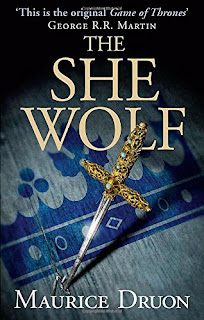By Paul Carrier
Maurice Druon’s series of historical novels chronicling the troubled French monarchy during the era preceding the Hundred Years War shifts much of its focus to the fate of England’s inept and despotic King Edward II in the fifth entry, The She Wolf.
The annals of France and England in the early 14th century are intimately connected because the titular she wolf — Edward’s queen, Isabella — is the sister of France’s King Charles IV. Despised and mistreated by Edward, Isabella flees to France with a rebellious English baron, Roger Mortimer. There, they plot Edward’s demise, raise an army against him and mount an invasion of England.
Known collectively as The Accursed Kings, the seven Druon novels chronicle the decline of France’s Capetian dynasty, which began to crumble after France’s King Philip IV and Pope Clement V disbanded the Knights Templar in 1312. When Philip burns the Templars grand master, Jacques de Molay, at the stake in the first novel, de Molay uses his dying breath to curse the king, two of his accomplices and their heirs to the 13th generation.
For the Capetians, things go downhill from there.
Druon tracks the scandalous, malicious, brutal goings-on with obvious relish as the French throne passes from Philip IV to his three sons — Louis, Philippe and Charles, in turn — and two subsequent rulers.
A recurring theme in The Accursed Kings — The She Wolf is no exception — is Druon’s portrayal of the 14th-century French nobility as small-minded, self-centered, blindly ambitious creatures with few redeeming qualities. If Edward II is any measure, the English fared no better, saddled as they were with a frivolous, impulsive and quick-tempered ruler ill-suited to wearing the crown.
“At this period the real similarity between the two countries lay in the persons of their kings,” Druon writes. “Both in London and in Paris the crown had devolved on a weak man, incapable of that true concern for the public good without which a prince is but a prince in name.” The great lords of France may have referred to their king as Charles the Fair, but the common people called him Charles the Fool because “he had not an ounce of brains behind his noble appearance.”
Other motifs illustrate the importance of banking interests in a world full of high-living but cash-strapped nobles; the religious and political muscle of the papacy in medieval Europe; the tenuous nature of power and fame; and the constant tug of war between the French monarchy and regional nobles at a time when the concept of nationalism had yet to reach its zenith.
Druon lays all this out while generally adhering to the historical record. George R. R. Martin, who has described The Accursed Kings as “the original Game of Thrones,” praises Druon for taking most of his plotlines “straight from the pages of history,” and Druon writes in a closing note that The She Wolf “keeps as closely as it can to the truth about the actions of human beings.”
The series, including The She Wolf, is particularly appealing because Druon manages to transform relatively obscure historical figures into flesh-and-blood characters whose strengths, shortcomings and selfish machinations captivate or repulse readers, but never leave us bored.
If the series has one minor drawback it’s Druon’s occasional habit of tossing about the names and titles of walk-on characters who play no real role in the advancement of the plot, seemingly for the sole purpose of impressing readers with how exhaustive the author’s research has been.
Druon’s serviceable writing often rises to a lyrical plane, as when he describes the demise of Charles of Valois, the imposing son, brother, uncle and father of kings who effectively ruled France on behalf of his nephew, the feckless Charles IV. At the height of his power, Charles of Valois suffers an apparent stroke, and The She Wolf movingly explores the painful introspection that consumes him in the days and weeks that follow.
Kirkus Reviews described The Iron King, the first book in the series as “historical fiction that reads like epic fantasy. Great stuff.” The same holds true for subsequent entries, including this one.

